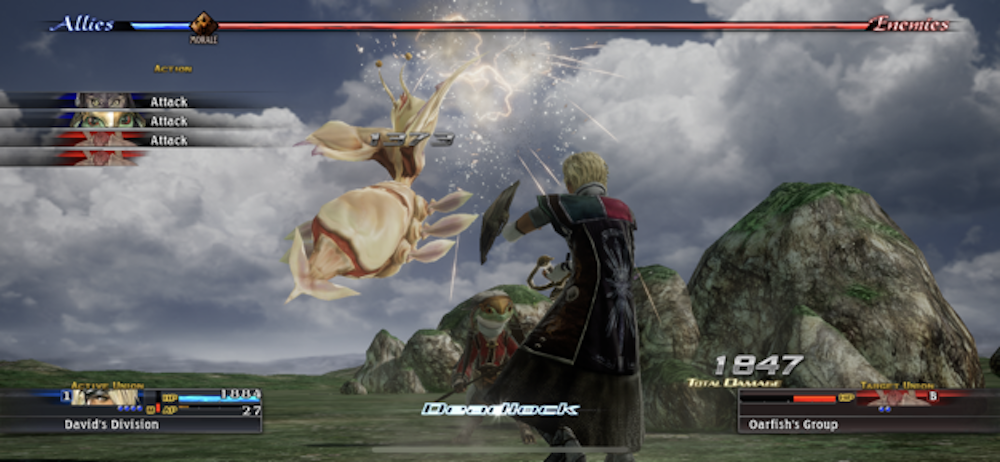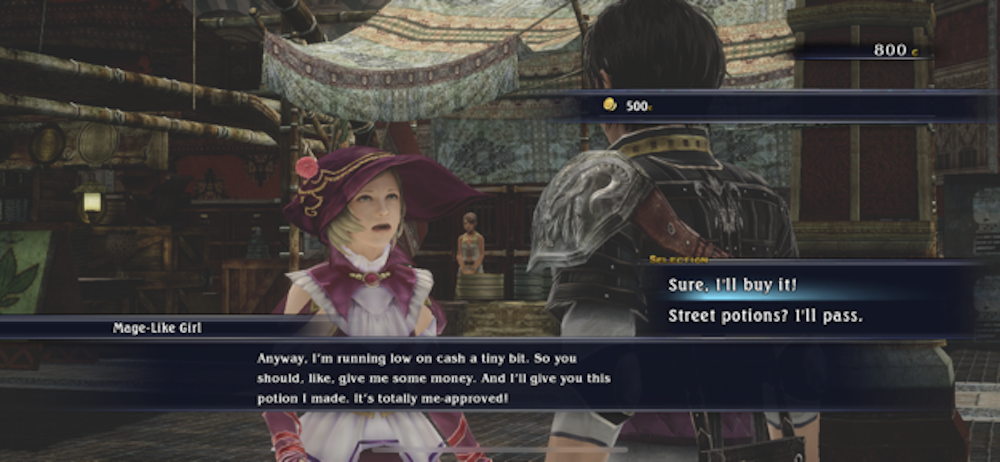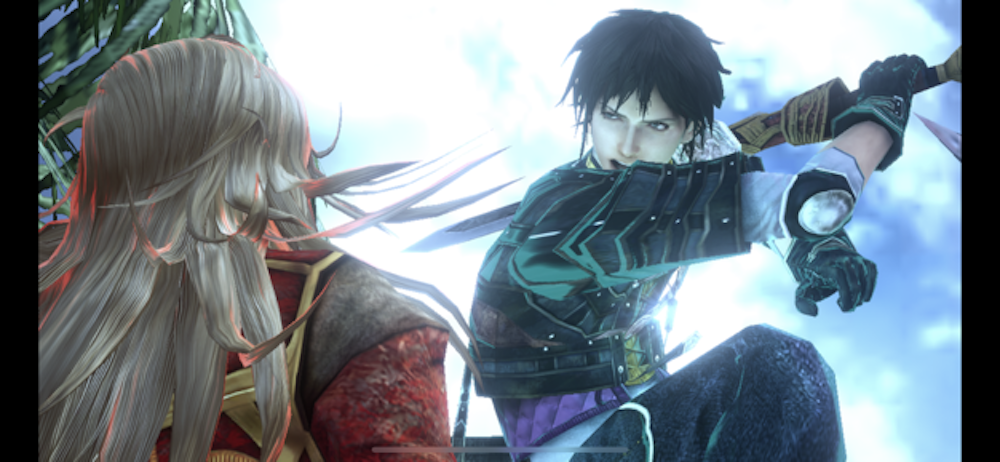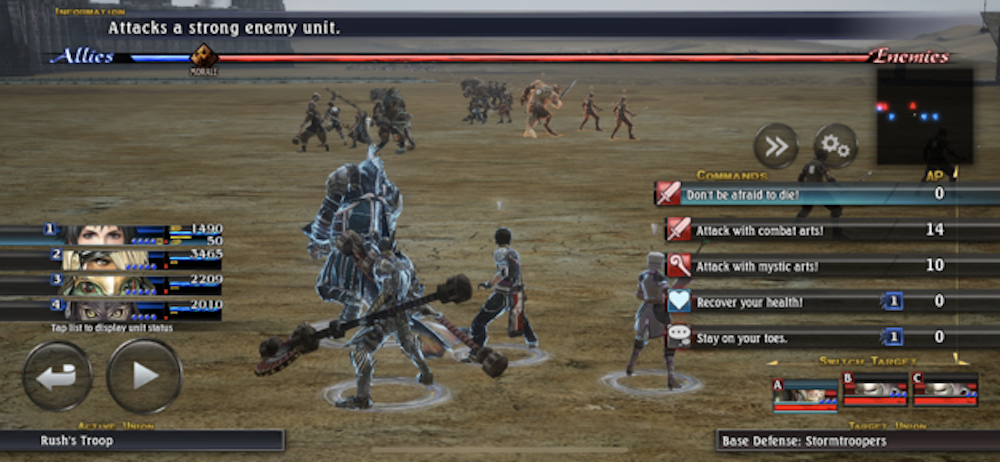 The Last Remnant originally comes from one of the more tumultuous eras in gaming. The seemingly infallible Sony had stumbled out of the gate with the PlayStation 3. Microsoft had surged in early to considerable success in the West. Nintendo had scored a massive out-of-nowhere hit with its unusual Wii system and was riding high atop both the console and handheld markets. Apple had brought out some weird mobile phone that seemed like it could play some games. No two regions had the same preferences, causing utter chaos for publishers. And Square Enix was arguably the poster child for that chaos.
The Last Remnant originally comes from one of the more tumultuous eras in gaming. The seemingly infallible Sony had stumbled out of the gate with the PlayStation 3. Microsoft had surged in early to considerable success in the West. Nintendo had scored a massive out-of-nowhere hit with its unusual Wii system and was riding high atop both the console and handheld markets. Apple had brought out some weird mobile phone that seemed like it could play some games. No two regions had the same preferences, causing utter chaos for publishers. And Square Enix was arguably the poster child for that chaos.
It was developing its own engine that it hoped to use in all of its future projects. It had announced multiple Final Fantasy projects, and none of them were coming together properly. Dragon Quest went handheld, and Microsoft was throwing money around for any substantial Japanese support. Square Enix had bet big on the PlayStation 3, and that was proving to be a bit worrisome. A lot of odd games came out at this time, and looking at it all from the outside you really have to wonder what was going on.

The Last Remnant was developed using Unreal Engine 3 by a team of people who had previously worked on the SaGa games. It was Square Enix’s first game using the engine, and one of the first big Japanese titles to do so. None of the documentation was available in Japanese, which caused a lot of issues. Although originally announced for both Xbox 360 and PlayStation 3, the game ultimately only hit the former. The latter version was quietly cancelled. The game didn’t sell particularly well, and there was good reason to think it would fall down the same memory hole as, say, Infinite Undiscovery.
Interestingly, the fact that the game was built on the Unreal Engine is likely why it avoided that fate. A PC version was created, and a rebuilt version using Unreal Engine 4 was launched across a variety of platforms. It’s this version that has now made its way to mobile in what is Square Enix’s biggest and most ambitious mobile port yet. Seriously, I hope you have a lot of spare room on your device. This game is massive. So hey, The Last Remnant Remastered ($19.99) must really be something, right? It got a mobile release before a lot of Final Fantasy games that would surely run on today’s devices, after all.

Well, that’s the tricky thing. The Last Remnant has a lot of good qualities. It’s a really nice-looking game. It’s certainly a full-fat RPG, with its main story taking a legitimate 60+ hours to clear and its side content adding a fair bit on top of that. It has some really interesting gameplay systems, and the story… well, the story has its moments, I suppose. If you’ve been thirsty for a big, high-budget single-player RPG to play on your mobile device, this will certainly quench that thirst.
That said, while this game wasn’t created under the direct guidance of eclectic creator Akitoshi Kawazu, it is very much his people. And that can, and does, mean certain things for its design. It has a very unusual battle system that isn’t overly well-explained and can be hard to understand if you don’t pay careful attention. There are a lot of seemingly random systems at play. Difficulty balance is all over the place. I’d say the average person is as likely to hate the game as they are to love it. It is opaque, complex, and not terribly well-paced. On top of that, you’ll have to contend with some occasionally awkward touch controls in this mobile version.

If you’re patient with it, there are rewards to reap. While it can take a while to wrap your head around its combat system, it’s quite a bit of fun once you do. You control groups rather than individuals, which gives battles a really nice sense of scale. You have to carefully consider the position of each group and the enemies, as you’ll take quite a bit of damage if you get yourself boxed in. You can do the same to the enemies, of course. Get them in a position where they can’t move without exposing their flank then send another group around to hit them from another angle, and you’ll deal heavy damage. Be mindful of this and most battles will go smoothly. Ignore it and even the simplest skirmishes can drag out.
There are a lot of other factors to take into account, many of which will be quite familiar to fans of the SaGa games. Formations are important, and which you’ll want to use will depend on which characters you’ve got grouped together. Stat gains happen somewhat randomly depending on the actions you take, but enemy strength will increase pretty consistently as your Battle Rank goes up. You can paint yourself into soft corners if you’re not careful because of this aspect. Each battle also has a meter that represents momentum, so the better you’re doing the more likely you’ll land hits and such. It’s a lot. And as mentioned, the game really does a terrible job of explaining any of this.

You also don’t have as much fine control as you may like. You give broad orders to each group based on the current situation, and each member will act as they see fit in accordance with that order. You really only have full say over protagonist Rush Sykes, and that extends to things like equipment and upgrades as well. Characters will ask you for new gear or the odd material they need to upgrade their own gear, and that’s about as much input as you get. It fits from a narrative point of view, to be sure, but some players may find all of this obfuscation quite frustrating.
Unfortunately, if you don’t get into the battle system, I’m not sure any other aspect of The Last Remnant is going to sell you on the game. The story starts with some promise but ultimately loses track of its own tail partway through. The exploration is relatively straightforward, and sidequests aren’t all that thrilling to complete. Like with most of the SaGa games, one gets the sense that the gameplay systems were designed first and the rest of the game was built around them. Those systems are very well designed, but they’re also so unconventional and complicated that you really have to put in a certain amount of effort to start having fun with them. And if you’re not willing to do that, I can’t say I blame you.
With all that in mind, it’s a bit hard to give The Last Remnant a terribly strong recommendation. I like the game well enough, but the pieces don’t fit together as well as some of the other games that Akitoshi Kawazu had a hand in. Even at its best, it doesn’t come anywhere near the sheer joy of SaGa Scarlet Grace‘s masterful gameplay. That’s a shame, because this game sure does look and sound great. If you’re willing to invest time and energy into a rather cumbersome game to find the gold within, you may enjoy The Last Remnant. But while it may not have the word ‘SaGa‘ in its name, know that it represents that brand’s typical ups and downs quite thoroughly in its essence. Proceed with caution.
 Like this article?
Like this article?
We pride ourselves on delivering quality, long-form articles like this one instead of the SEO-driven click bait that is slowly taking over the internet. Unfortunately, articles like these rarely generate the traffic (and as a result, the ad revenue) of listicles, cheat guides, and other junk.
Please help us continue producing content like this by supporting TouchArcade on Patreon, doing your Amazon shopping by first visiting toucharcade.com/amazon, and/or making one-time contributions via PayPal.
from TouchArcade https://ift.tt/37cBmCR
0 comments:
Post a Comment